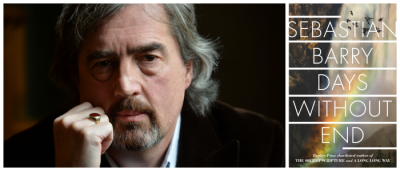Author Spotlight: Sebastian Barry
9th May, 2017
We asked Sebastian Barry, previous winner of the Walter Scott Prize and now shortlisted for Days Without End, to tell us a bit more about his magnificent, multi-award-winning novel.
Q: What do you think about being shortlisted for the Walter Scott Prize for Historical Fiction? Do you see yourself as a historical novelist?
A: Having won this wonderful prize in 2011, I am highly aware of the magic of it. To be short-listed again felt like a great honour — a great excitement too. It seems to me that the prize itself has not only boosted and bolstered the historical novel, but also has begun to redefine it. I am an historical novelist in the sense that I have to go back into history to find these lost remnant members of my family, where usually the waters of time have closed definitively over their heads, and erased them.
Q: How did the people and times you write about in this novel first lodge in your imagination?
A: When I was about eight I shared a bedroom with my much-travelled grandfather. One night he told me in passing that a great uncle of his had fought at the Indian Wars in America. I thought I knew what he was talking about, because my generation was reared on cowboy films. So it was the beginning of thinking about this lost and silenced man for the next fifty years, and finally seeming to discover him in my work-room, ready to speak to me.
Q: What role does research have in your writing? When does the fiction take over from the facts?
A: For a novel like this I have to read for a year or so — all sorts of books, histories of the Indian Wars, the American Civil War, then more particular books about tobacco farming in the 1850s, Buffalo hunting, tribal customs, rifles of the era, first-hand and eye witness accounts, memoirs. But walking to a very instinctive drumbeat, most of the time not really sure what might be useful. Then the job is to forget as much as possible, so that in the actual writing of the book things rise up as if I had seen and heard them myself, in some strange long ago.

